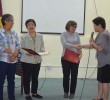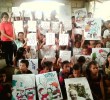JANUARY 8, 2015
On Thursday, Nerlita “Nerlie” Ledesma became the first journalist murdered in the Philippines in 2015.
Unidentified gunmen on a motorcycle shot and killed Ledesma, a 48-year-old reporter for the Abantetabloid newspaper in the city of Balanga in central Luzon’s Bataan province, while she was on the way to work. Police are probing the circumstances of Ledesma’s death to determine if her killers specifically targeted her because of her job.
Ledesma’s killing occurred just one day after the horrific attack on staffers of the French satirical magazineCharlie Hebdo. But while the atrocity in Paris was a shockingly unprecedented attack on media for France, killings of journalists in the Philippines have become shockingly routine. Despite the country’s reputation as a regional bastion of free media un-hobbled by official censorship, journalism is a deadly line of work in the Philippines. On November 23, 2009, in the country’s single worst killing of journalists, a local ruling family’s “private army” on the southern island of Mindanao massacred 30 media workers and 28 supporters and family members of an opposition politician with whom they were traveling.
National Union of Journalists of the Philippines statistics indicate that by the end of 2014, a total of 30 Philippine journalists had been killed since President Benigno Aquino III came to office in 2010. Adding insult to fatal injury has been his government’s failure to bring to justice the perpetrators of the vast majority of these killings. There have been arrests in only six of the journalist murder cases during Aquino’s time in office. In only two of those cases have the gunmen been convicted – but not the masterminds who ordered and paid for the murders.
That official apathy in the face of a steadily mounting death toll of Philippine journalists has sent a clear signal to those who feel threatened by a free media – many of them powerful local officials – that killing journalists carries little risk of arrest and prosecution. Until Aquino summons the political will to ensure that killers of reporters go to prison for their crimes, 2015 will be another deadly year for Philippine journalists.
Phelim Kine is deputy director of the Asia Division at Human Rights Watch.









